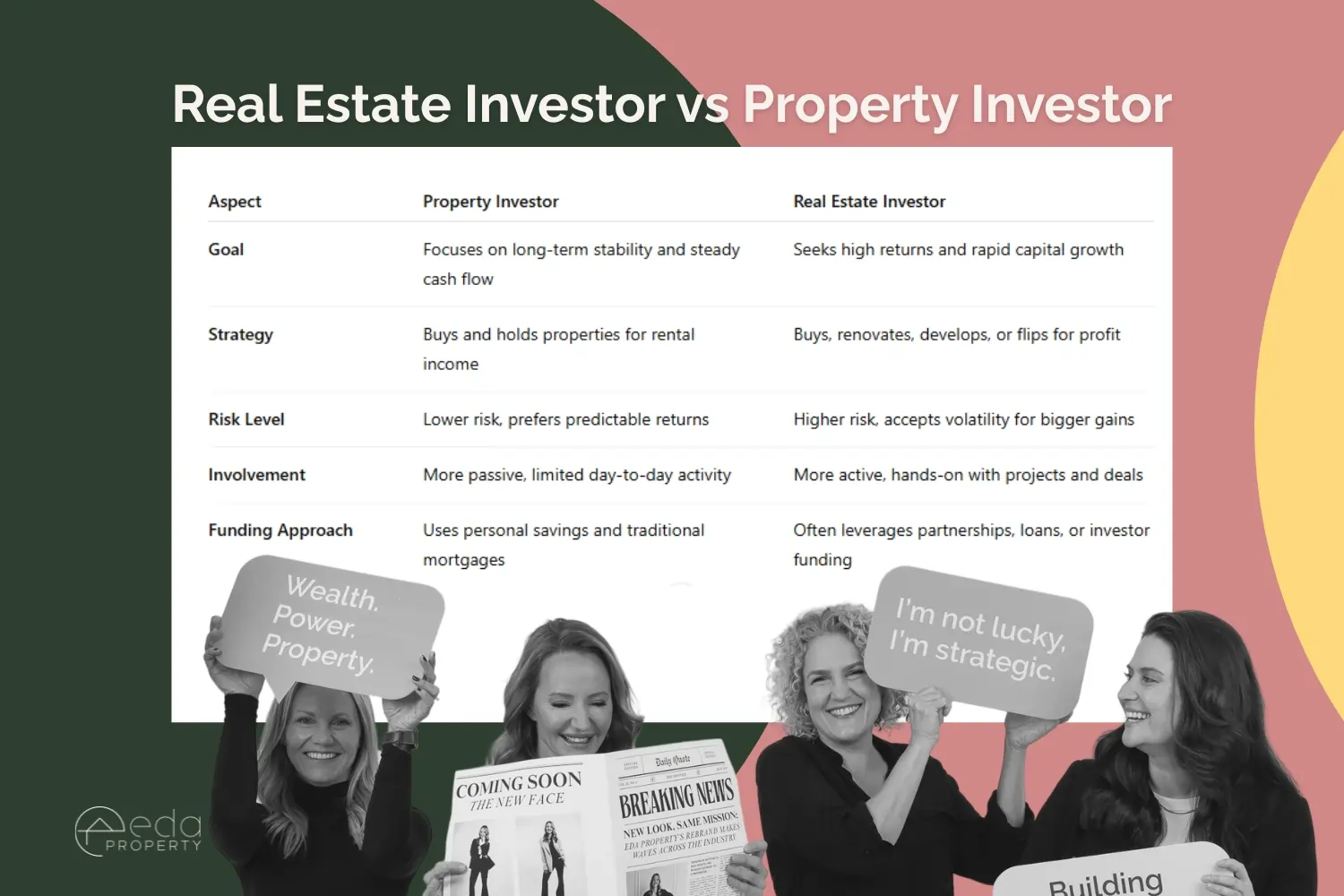
Many Australians use the terms real estate investor and property investor as if they mean the same thing. Both involve buying real estate and earning returns from it. Yet their focus, strategy, and level of involvement can be very different. Understanding those differences helps investors plan smarter, balance their risks, and build a clearer path toward long-term financial goals.
Both investor types play vital roles in Australia’s property market. One focuses on consistent income and gradual growth. The other seeks broader opportunities through diversification and active management. Recognising where you fit can shape how you approach your next investment.
Defining a Property Investor
A property investor typically focuses on buying residential or commercial properties for rental income or future resale. The aim is steady, long-term growth. Many investors purchase a single home or unit, rent it out, and hold it for several years while property values rise.
This approach suits investors who prefer a predictable stream of rental income with moderate risk. They usually follow a property investment strategy that combines cash flow with capital appreciation. Location, rental demand, and maintenance costs are key factors in every decision.
Property investors tend to view their assets as long-term holdings. They may own one or two investment properties and rely on capital growth to build equity over time. It is often a more passive investment style. Once the property is tenanted, management tasks are handled by agents or property managers.
This form of investing is popular because it is tangible, easy to understand, and often supported by lending institutions. It also provides the potential for tax benefits through negative gearing and depreciation. For many Australians, property investing is the first step toward wealth creation through property.
Defining a Real Estate Investor
A real estate investor usually operates at a larger or more strategic level. While a property investor may hold one or two rentals, he/she might manage multiple properties, development projects, or commercial portfolios.
Their involvement can include buying and renovating properties to sell at a profit, known as flipping, or pooling capital with others through syndicates and trusts. They may explore commercial, industrial, or mixed-use developments. The approach is broader and often more active.
They typically have a deeper understanding of market cycles, finance, and development processes. They analyse zoning laws, construction costs, and yield projections before committing to a project. This kind of investing demands more time, capital, and experience, but it can also deliver higher returns.
They often treat their work as a business. They might employ accountants, project managers, and brokers. Some even manage teams for real estate portfolio management, balancing properties across states or sectors to spread risk and maximise performance.
Key Differences in Strategy of Real Estate Investors vs Property Investors
Although both groups invest in real estate, their strategies differ significantly. Property investors tend to favour long-term stability and lower risk. They focus on cash flow, reliable tenants, and steady growth. The goal is often to build equity slowly while paying off loans.
Real estate investors, on the other hand, accept more risk in pursuit of higher returns. They use leverage, partnerships, or development funding to expand quickly. Their strategy is more active and may involve short-term gains through buying, renovating, and selling.
Risk tolerance also separates the two. A property investor seeks security and predictability. He/she is also comfortable with market fluctuations and project-based uncertainty. One values passive income, while the other values active capital growth.

Both strategies can succeed when matched to the investor’s skills, finances, and time availability. The key is knowing which path suits your personality and long-term goals.
Investment Scale and Market Involvement
Scale plays a defining role in this comparison. A typical property investor manages one or a few properties, often within a familiar suburb or city. Their decisions are guided by local knowledge, personal savings, and access to mortgage finance.
A real estate investor operates on a broader scale. They might hold residential and commercial assets across multiple regions. Some run property development projects or invest in real estate funds. Larger scale brings greater opportunity for profit but also more complexity and exposure to market risk.
Market involvement also differs. Property investors usually monitor rental returns and property values occasionally. They track building approvals, infrastructure plans, and economic indicators that affect future growth. They treat their investments like a business portfolio that requires regular review and adjustment.
This broader involvement often requires more sophisticated financial management. Many real estate investors rely on advisers to help structure their investments for tax efficiency, asset protection, and cash-flow balance.
Which Approach Is Right for You?
Choosing between being a property investor or a real estate investor depends on your goals, resources, and risk appetite.
If you prefer a steady income stream and limited day-to-day involvement, property investing might suit you best. It offers a tangible asset, predictable returns, and a clear path for gradual wealth building. You can start with a single property and expand when your finances allow. You can also partner with a property investment advisor to further enhance your property investment capability.
If you enjoy analysing markets, managing projects, or taking calculated risks, real estate investing could be a better fit. It provides greater scope for creativity, diversification, and growth. However, it demands more time, knowledge, and financial commitment.
Consider how much time you can dedicate to your investments. A property investor can manage most tasks with an agent’s help. A real estate investor often needs to be hands-on. Think about your experience level too. Starting small helps you understand the fundamentals before taking on larger, complex projects.
Ultimately, both approaches can deliver success. Some investors start with residential properties and later transition into commercial or development ventures as their confidence and resources grow.
Conclusion
The terms real estate investor and property investor describe people with similar goals but different methods. One prioritises stability and steady returns. The other pursues scale, diversification, and active growth. Both contribute to Australia’s vibrant property market and play essential roles in supporting housing supply, construction, and investment confidence.
Understanding the distinction helps you align your investments with your financial objectives. Whether you prefer the steady pace of buying a property or the dynamic opportunities of real estate projects, clear strategy, effective money management, and informed decisions remain the foundation of success.
In the end, smart investing is about balance. It’s about managing risk, capital, and opportunity to build lasting wealth and financial freedom.
Frequently Asked Questions
Check out the questions about the difference between a real estate investor and a property investor
What does a real estate investor do?
A real estate investor buys, develops, or manages property to make a profit. This may include residential, commercial, or mixed-use projects. Some hold properties for rent, while others focus on flipping or development.
What creates 90% of millionaires?
Studies show that the majority of millionaires build wealth through real estate. Property ownership provides long-term capital growth, stable income, and leverage opportunities that compound over time.
How much does a property investor earn?
Earnings depend on factors such as property value, rental yield, and location. A single property might produce modest returns, while experienced investors with larger portfolios or developments can earn significant profits.
Can you invest $5,000 in real estate?
Yes, but not through direct property ownership. With $5,000, investors can access real estate through crowdfunding platforms, property trusts, or managed funds, allowing participation without buying a full property.
Share this story!
Buyer’s Agent vs Property Advisor: Which One Do You Actually Need?
If you have ever found yourself torn between using a buyer’s agent or a property advisor, you are definitely not alone. It is one of the [...]
Buying an Investment Property with Just $50 a Week: A Step-by-Step Guide
Buying an investment property might seem out of reach if you’re starting with a small budget, but with the right strategy, it’s absolutely achievable even with [...]
Real Estate Investor vs Property Investor: What’s the Real Difference?
Many Australians use the terms real estate investor and property investor as if they mean the same thing. Both involve buying real estate and earning returns [...]
Get in touch with our property investment advisors today!
Life changes – your property strategy should too. We review your portfolio yearly and support you every step of the way.
We respect your privacy. View our Privacy Policy.
Get in touch with our property investment advisors today!
Life changes – your property strategy should too. We review your portfolio yearly and support you every step of the way.
We respect your privacy. View our Privacy Policy.




